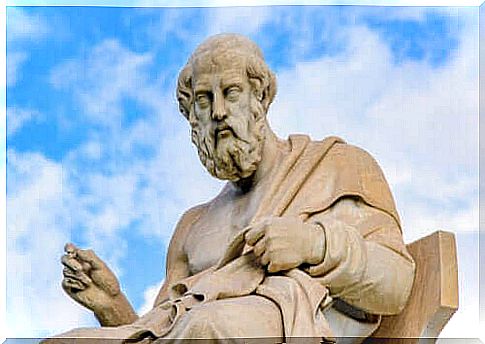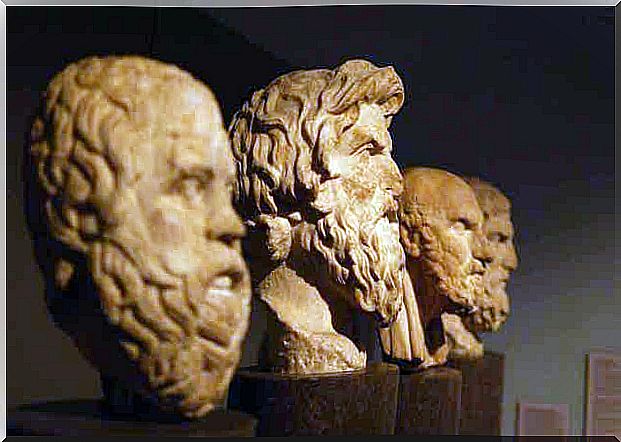The Differences Between The Philosophies Of Aristotle And Plato

The philosophies of Aristotle and Plato are perhaps the most influential in Western culture thinking. Most later philosophical and scientific movements are based on this.
However, although Aristotle was a disciple of Plato, the latter had many disagreements with his teacher. We will therefore present the main differences between their two philosophies.
The Differences Between the Philosophies of Aristotle and Plato

We can classify the discrepancies between the philosophies of Aristotle and Plato into the following categories: ontological, epistemological, and ethical. We will discuss them further below.
Aristotle and Plato had ontological differences
In explaining the essence of things, Plato argues that there are two realms: the one observable (physical) and the other intelligible (that of ideas).
- The first consists of everything we can experience through the senses. It is characterized by multiplicity, by pure appearance and by constant changes. It is therefore false and deceptive.
- In contrast, the realm of ideas is true, imperishable and immutable. There reside the universal and necessary ideas, which are thus the essence of all that exists.
The objects and bodies of the physical realm are therefore only imperfect reflections of this world. For example, in the observable realm, there are a multitude of cats, and each individual is different from the other. In the comprehensible world there is an absolute idea of a cat, which makes it a cat and not something else.
Aristotle, on the other hand, denies the existence of an intelligible world. For him there is only one real world: the sensory world, which consists of substances, which consists of matter and form (their essence).
Epistemological differences
With regard to the explanation of human knowledge , Plato defended the idea that we could acquire true knowledge by accessing the world of ideas. This is because, as we said, everything in the sensory world is nothing more than appearances and deception.
So how do we get these ideas? For Plato, all people have a soul that dwells in the body. In the soul lies the whole source of scientific knowledge, for the soul already knows the ideas because it is in the intelligible world. The most appropriate term is therefore not to know, but rather to remember.
In this sense, Plato is a proponent of innate ideas and the immortality of the soul. That said, he suggests that the only valid method of accessing the soul’s memories is dialectics. This is a process of ascension, through reason, that goes from ignorance to the contemplation of ideas.
On the other hand , Aristotle defends the idea that we find the origin of truth in the sensory world. For this thinker, we can acquire scientific knowledge only through its causes. The senses are therefore the origin of all knowledge.
For Aristotle, there are no innate ideas. Instead, he affirms that the mind is a tabula rasa (clean slate) and that it is only through a process of abstraction that it is possible to arrive at the essence. In the same way, Aristotle rejects the method his teacher proposes. For him, induction and deduction are the only scientific methods of knowledge.
Aristotle and Plato had ethical differences
Another difference between the philosophies of Aristotle and Plato is the conception of the ethical good. For Plato, there is a connection between ethics and knowledge. This is because, according to this thinker, the only way to access good and moral perfection is through a progressive approach to the truth.
Anyone who does something wrong does it because he is ignorant. This fits in with his philosophy. For Plato, there is an idea of the good, which we can only access through the scientific method he proposed.
Aristotle, on the other hand, formulates a finalist and eudemonic ethic and defends the idea that the purpose of life is to achieve happiness. According to this philosopher, we obtain morally good deeds by finding the golden mean between generosity and selfishness.
That is, between a distant and altruistic attitude towards others and an interest in our own well-being. This balance is identified by reason. So if we recognize it, then we can achieve happiness.
Anthropological Differences
Regarding the conception of man, Plato proposes an anthropological dualism. He affirmed that all people are formed by two distinct and independent substances: the body and the soul. The first belongs to the sensory world and the second to the intelligible.
As we have said, for Plato the soul is immortal and can live separately from the body. It therefore returns to the world of ideas after the death of the body. According to this philosopher, the human soul also consists of three parts: a rational part, an irascible part and an indulgent part.
For Aristotle, on the other hand, man is a single substance, composed of matter (body) and form (soul). The soul is the vital engine, but it cannot live apart from the body. In this case, Aristotle distinguishes three kinds of souls: vegetative, sensitive and rational.
The Differences Between the Philosophies of Aristotle and Plato

While there are great differences between the philosophies of Aristotle and Plato, the influence the master had on his student cannot be denied. They even resemble each other in some respects, as both formed an essentialism. That is, they affirm that all things in the world have an essence that makes things what they are and not something else.
At the same time , both philosophers defend the existence of an eternal entity, which does not belong to the senses and is the most real that exists. For both Aristotle and Plato, this entity is the cause of all reality.
In religious terms, it would be God the creator of the universe. However, Plato represented him with the idea of good, while Aristotle represented him by his notion of the unmoved mover.
Philosophy after Aristotle and Plato
The ideas of both thinkers influenced the emergence of different streams of Western thought. Their ideas permeated various philosophical, political, scientific and religious points of view. Some of their influences can be found in empiricism, idealism, rationalism and Christianity.









